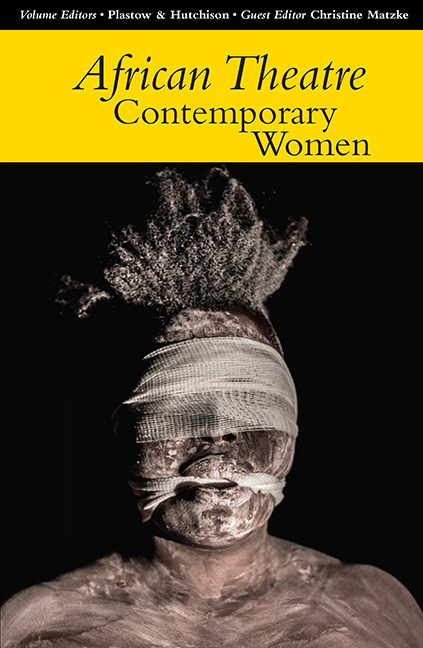Book contents
- Frontmatter
- Contents
- Notes on Contributors
- Editors’ Foreword: Women on the Front Line
- Introduction: Citizen & Artist: African women making theatre
- The Work of Dalia Basiouny: An artist's account
- Performativities as Activism: Addressing gender-based violence & rape culture in South Africa & beyond
- Exploring Poetic Voice in the Uganda Women's Intergenerational Theatre Project
- ‘After Images’: Impressions of the ‘after’ by South African performerchoreographer Mamela Nyamza
- Jalila Baccar of Tunisia: A portrait of an artist
- In Conversation: Interrogating & shifting societal perceptions of women in Botswana through theatre
- Binti Leo: Women in the arts in Tanzania
- Odile Gakire Katese: Making art & reinventing culture with women
- Contemporary Ethiopian Actresses
- Introducing The Sentence
- Playscript
- Book Reviews
‘After Images’: Impressions of the ‘after’ by South African performerchoreographer Mamela Nyamza
Published online by Cambridge University Press: 05 July 2016
- Frontmatter
- Contents
- Notes on Contributors
- Editors’ Foreword: Women on the Front Line
- Introduction: Citizen & Artist: African women making theatre
- The Work of Dalia Basiouny: An artist's account
- Performativities as Activism: Addressing gender-based violence & rape culture in South Africa & beyond
- Exploring Poetic Voice in the Uganda Women's Intergenerational Theatre Project
- ‘After Images’: Impressions of the ‘after’ by South African performerchoreographer Mamela Nyamza
- Jalila Baccar of Tunisia: A portrait of an artist
- In Conversation: Interrogating & shifting societal perceptions of women in Botswana through theatre
- Binti Leo: Women in the arts in Tanzania
- Odile Gakire Katese: Making art & reinventing culture with women
- Contemporary Ethiopian Actresses
- Introducing The Sentence
- Playscript
- Book Reviews
Summary
Introduction
The after-image is primarily produced by memory and the imagination. It is the emotional or psychological recall/re-imagining of something that is not immediately present to the senses. Both 19-Born-76-Rebels(2013) and Isingqala(2011) evoke after-images in considering South Africa's past alongside its present. This chapter examines what vestiges of the past remain in Nyamza's present lived experience, and specifically, in what images does the ‘after’ manifest itself in Nyamza's work. 19-Born-76-Rebelsrecalls the Soweto Riots and massacre of 1976, focusing on the education black children received in that era. Nyamza uses after-images of her own black girlhood to explore the persisting damage of an inadequate education.
19-Born-76-Rebelsdoes not rely on set properties or a conventional performance space. The performance primarily uses physical theatre, with very few word-based moments, to drive the plot. The focus is on the actor's ornate and telling costumes and their physicality and interaction with each other in the space. In performance, each scene is designated a separate playing space; first there is the introduction of two polarizing figures standing (on makeshift stilts) opposite one another centre stage. Their ten minute standoff includes only slight movements as they simultaneously look down, signalling the distance to the ground. Neither figure wants to make the first move; one lifts her arms as if to take a step, but then does not. This play is mirrored and repeated between them. The performers then disrobe and transition into young girls in the next scene, upstage on a stairway, at first cheerful as they run and play. The German shepherd dogs, visible from the margins, form part of the action, reminding the girls and audience mnemonically about colonial power, signalled through these guard animals. The mood quickly turns sober as the girls are intimidated in the next scene, which takes place downstage centre, and in the following scenes. This sets the tone for the rest of the performance, which is dominated by a huge book (the only set property) in a make-believe schoolroom. The physical interaction with the book in the imagined schoolroom highlights how these girls experienced school as an ordeal, a burden, and evokes the inequality of their education which leaves them exhausted, sweating and breathless as they eventually walk off stage slowly, carrying the book.
- Type
- Chapter
- Information
- African Theatre 14: Contemporary Women , pp. 41 - 53Publisher: Boydell & BrewerPrint publication year: 2015



